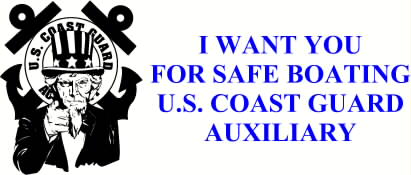So…. What do we do?
The Coast Guard Auxiliary is a multi-mission organization, there are various ways that
we can participate to augment the Active Duty members or educate the boating
community. The following list is not all-inclusive, however, it provides an idea as to the
missions that we have undertaken.
Qualifications
Auxiliary Instructor (IT) for Public Education (PE) and Member Training (MT)
ITs can teach either or both Auxiliary PE and/or MT courses. Additionally, experienced
ITs shall serve as prime mentors in qualifying new ITs, improving the skills of current
instructors, and assisting in the NM program.
Boat Crew Program
Auxiliarists who wish to participate in authorized Auxiliary surface operations must be
BQ. The specific requirements (minimum standards) for qualification, currency
maintenance, certification, and recertification can be found in the Auxiliary Boat Crew
Training Manual (COMDTINST M16794.51 (series); Auxiliary Boat Crew Qualification
Guide, Volume I: Crew Member, COMDTINST M16794.52 (series); Auxiliary Boat
Crew Qualification Guide, Volume II: Coxswain, COMDTINST M16794.53 (series);
Auxiliary Boat Crew Qualification Guide, Volume III: PWC Operator, COMDTINST
M16794.54 (series).
Air Operations Program
Aircraft facility owners and Auxiliarists wishing to participate in Auxiliary air operations
must be BQ and complete an air operations training course. The Auxiliary Operations
Policy Manual, COMDTINST M16798.3 (series), provides the specific requirements and
is the principal document for the Auxiliary Aviation program.
Other Operational Programs
Training programs are available for those Auxiliarists wishing to take part in other
Auxiliary operational programs. Additional details may be found in the Auxiliary
Operations Policy Manual, COMDTINST M16798.3 (series). Some of these additional
programs include:
1. Qualified watch standing at Coast Guard active duty units or Auxiliary radio
facilities, including Telecommunications Operators.
2. Aids to Navigation verification and AtoN repair.
(…)
Auxiliary Food Services (formerly known as AUXCHEF)
Auxiliary members learn how to interact with Active Duty members in the Galleys in
various venues in order to support, augment, and back –fill for Food Service Active Duty
members when needed. The training incorporates the FS3 Striker Course to help
Auxiliarists learn about common practices, sanitation, and food preparation in the Coast
Guard. Special events that require more hands than billeted can warrant the use of
Auxiliary members who are trained in this capacity. Special events include private
dinners, catering, Change of Commands, holiday dinners, retirements, and special guest
honors.
Other Non-Operational & Administrative Programs
Training programs that lead to specific qualifications are available for those Auxiliarists
wishing to take part in other Auxiliary non-operations and administrative programs.
Some of these additional programs include:
1. Dockwalker
2. Assistant Contingency Planner (AUX-ACP)
3. Assistant Federal On-Scene Coordinator Representative (AUX-ET)
4. Assistant License and Document Evaluator (AUX-LDEV)
5. Assistant License and Document Examiner (AUX-LDEX)
6. Prevention Outreach Specialist (AUX-MEES)
7. Marine Safety Administrative and Management Specialist (AUX-MSAM)
8. Port State Control Dispatcher (AUX-PSC)
9. Assistant Waterways Management Representative (AUX-WM)
Recreational Boating Safety Visitation Program (RBS-VP)
Auxiliarists may seek qualification as a Program Visitor (PV). To do so, the Auxiliarist
must be BQ and be familiar with the contents of the Vessel Safety Check Program,
COMDTINST M16796.7 (series), and the Recreational Boating Safety Visitation
Program Manual, COMDTINST M16796.3 (series).
Operational Auxiliarist Program (AUXOP)
Auxiliary members earn and wear the AUXOP device in lieu of the Specialty Training
Ribbon, after successfully completing core courses, leadership courses, and a
combination of elective courses.
